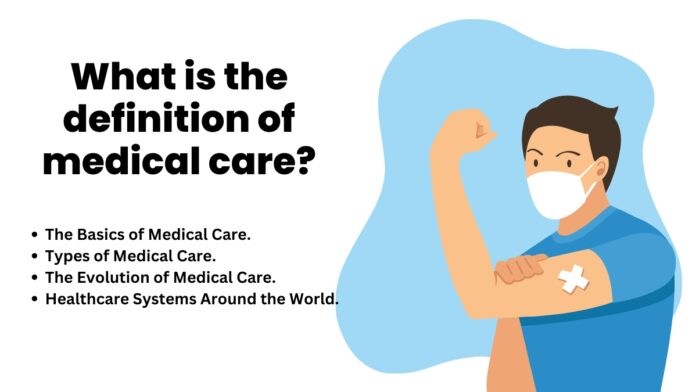Medical care is essential; it is a safety net for health issues, from minor illnesses to more serious conditions. But what does medical care involve? This question leads to a deeper understanding of how we care for our bodies and minds.
In a time when healthcare options are plentiful but often confusing, it is crucial to understand the definition and scope of medical care. Whether you are navigating your health journey or simply seeking a better understanding of the healthcare system, grasping this concept can be empowering. Let’s delve into the fundamentals and examine modern medical care’s components!
The Basics of Medical Care.
Medical care includes services aimed at promoting, maintaining, and restoring health. It involves preventive measures, diagnostic tests, treatments, and ongoing disease management. Preventive care focuses on maintaining good health through vaccinations and regular check-ups. Diagnostic services, such as blood work and imaging, are used to identify illnesses or injuries.
Treatment options, including medication, surgery, and physical therapy, are tailored to address specific health concerns. For chronic conditions like diabetes or hypertension, ongoing management involves consistent monitoring and adjustment of treatment plans. Understanding these fundamentals is essential for navigating today’s complex healthcare landscape.
Types of Medical Care.
Medical care comes in many forms, each tailored to specific needs. Primary care serves as the first point of connection for patients. It’s where general health concerns are addressed, and preventive measures are emphasized. Specialized medical care focuses on particular areas, such as cardiology or orthopedics. Here, experts examine complex conditions that require targeted treatment plans.
Acute care is critical when immediate attention is necessary. This includes emergency rooms and urgent care facilities designed to effectively handle sudden illnesses or injuries. Chronic care management supports individuals with long-term health issues such as diabetes or heart disease. It emphasizes ongoing monitoring and lifestyle adjustments to improve quality of life.
Palliative and hospice care prioritize comfort over cure. They help patients manage pain during serious illness stages while offering emotional support for families facing difficult times.
The Evolution of Medical Care.
Medicine has evolved significantly, from ancient healers using herbs and rituals to modern-day practitioners utilizing advanced technologies. In ancient civilizations, medicine was closely tied to spirituality, with healers and religious leaders addressing physical and spiritual well-being. Knowledge was passed down orally, creating a diverse tapestry of traditions.
The Greeks introduced systematic medical observations, and Hippocrates emphasized clinical practice, laying the foundation for ethical standards. In the Renaissance period, they focused on anatomy and dissections, leading to a scientific understanding of human physiology.
Medical care evolves with each technological advancement, from vaccines to MRIs. Digital health records and telemedicine have made healthcare more accessible, raising new questions about privacy and patient rights.
Healthcare Systems Around the World.
Healthcare systems vary dramatically globally, reflecting cultural values and economic structures. In countries like Canada and the UK, universal healthcare is a norm. Citizens receive medical services funded by taxes, ensuring access for all. In contrast, the United States operates on a mixed system with private insurance dominating. While some enjoy comprehensive coverage, millions remain uninsured or underinsured.
Emerging economies face their challenges. Nations such as India grapple with balancing traditional practices alongside modern medicine while striving to expand access in rural areas. Meanwhile, Scandinavian countries boast high-quality care with minimal waiting times due to efficient public funding and administration. Each model has strengths and weaknesses. Understanding these differences can shed light on how policy decisions worldwide influence health outcomes.
Challenges and Controversies in Medical Care.
Medical care today faces numerous challenges. Access remains a significant issue, particularly in rural areas and low-income communities. Many people cannot reach facilities or afford necessary treatments. Another ongoing controversy concerns the pharmaceutical industry. The high cost of medications often leaves patients struggling to manage their health conditions effectively, raising ethical questions about pricing transparency and corporate responsibility.
Healthcare disparities continue to be a pressing concern as well. Marginalized groups frequently encounter barriers that affect their treatment options and outcomes. Additionally, mental health services still lag behind physical healthcare in terms of resources and acceptance. Stigma persists, which can deter individuals from seeking help when needed.
Technology integration introduces its hurdles, too—data privacy issues arise alongside the push for telemedicine solutions, leaving many uncertain about security and effectiveness.
How to Access and Afford Medical Care.
Navigating the world of medical care can be overwhelming, especially when accessing and affording services. Start by researching your options. Look into local clinics that offer sliding scale fees based on revenue. Health insurance is crucial. If you’re eligible, government programs like Medicaid or Medicare provide essential coverage for many individuals. Check with your employer about available health plans if you’re working.
Remember community resources. Nonprofits often help connect patients with low-cost healthcare providers and financial assistance programs. If you need prescriptions, ask your doctor for generic alternatives or discount pharmacies that might save you money. Patient assistance programs from pharmaceutical companies can also offer relief. Consider preventative care as a way to reduce future costs. Regular check-ups and screenings can catch issues early, leading to better outcomes and lower expenses.
Conclusion.
Medical care is a crucial part of our lives, encompassing a wide range of services to maintain and improve health. From regular check-ups to specialized treatments, the scope of medical care is extensive and constantly advancing. Understanding the different types and systems of medical care used worldwide helps us appreciate how various communities address healthcare needs. However, accessibility, affordability, and ethical dilemmas remain prominent and require attention.
As we navigate this complex landscape, individuals need to be informed about their options for accessing medical care. While the journey may have obstacles, resources are available for those seeking to understand or improve their healthcare experience. Engaging with these topics promotes awareness and encourages discussions on enhancing medical services for everyone. Informed citizens can drive change in the healthcare system and improve outcomes for all.



